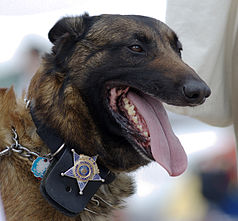This is Zeus.
According to the Supreme Court, we can all trust Zeus to protect our Fourth Amendment rights. Doesn’t he look smart and trustworthy?
Well, at least he is cute. This is Aldo.  He was a police dog in Florida. Clayton Harris, a man addicted to methamphetamine, was pulled over for an expired license plate. Harris was nervous and acting funny, but that wasn’t enough to give the police the right to search the vehicle. The police officer asked to search, but Harris said no. So the police had Aldo sniff around the car. Aldo signaled that he smelled something funny by the door. The police used that as grounds to search the car, where the police found evidence of materials used to make methamphetamine. Harris was read his rights, and then started blabbing about being addicted to meth. During his trial, his lawyer tried to suppress the evidence, but the court refused. Harris later appealed.
He was a police dog in Florida. Clayton Harris, a man addicted to methamphetamine, was pulled over for an expired license plate. Harris was nervous and acting funny, but that wasn’t enough to give the police the right to search the vehicle. The police officer asked to search, but Harris said no. So the police had Aldo sniff around the car. Aldo signaled that he smelled something funny by the door. The police used that as grounds to search the car, where the police found evidence of materials used to make methamphetamine. Harris was read his rights, and then started blabbing about being addicted to meth. During his trial, his lawyer tried to suppress the evidence, but the court refused. Harris later appealed.
Harris actually won in the Florida Supreme Court, which ruled that not just any dog will do to create probable cause to search, but only a special dog that meets the checklist of qualifications the Court created. The Court wanted the police to show a record of accurate signals versus false alarms, and give proof of training. Sorry, Zeus.
Yesterday the U.S. Supreme Court reversed, ruling that a dog’s sniff can be grounds for probable cause if a “reasonably prudent person” would believe that the dog’s actions would turn up evidence of illegal activity. As Justice Kagan put it, “[a] sniff is up to snuff when it meets that test.”
The law at issue here is the Fourth Amendment to the Constitution. The Fourth Amendment protects us against unreasonable searches and seizures by the government, which are defined as those without a warrant. There are some exceptions to the warrant requirement, and a car is particularly vulnerable to those exceptions. But it still remains that in order to do a search, the police must have “probable cause.” Now, however, even Zeus can provide probable cause. Here’s one more picture of Zeus, just so you know who will be determining your rights.
** No animals were harmed in the writing of this blog. Unless you count being dressed up by a six year old as harm.**


10 Comments
Yujing Cai posted on February 20, 2013 at 6:58 pm
I like this case because I really like dogs. I believe that a dog is unlikely to give false judgement with smells, unless there was food in the car.
As stated in class, when the policeman smells something unusual he is capable of checking the car without a warrant. Similarly,these dogs, as a kind of police entity, should be trusted of their judgements.
Some people may argue that the policeman can give direct the dog to give wrong signals. To respond, I think the policeman will not go on the street just to randomly pick on cars passing by. We need to trust them and their professional judgement. They must have sensed something wrong before they mislead the dogs. If people are concerned with such behaviors, we can raise the bar in the psychological evaluations to make sure that the policemen are ethically qualified.
Therefore I believe that the signal from a police dog is a probable cause.
By the way, Zeus is so cute!!!
Pooja posted on February 22, 2013 at 2:11 pm
This seems pretty ridiculous, especially since they need to look into the dog’s background to see if his sniffs have been accurate. But, it makes sense. It can’t be any dog giving a police officer the right to search a car, it should be one with credentials, hired to do the job. It seems crazy considering it’s a dog, but I guess it shows the power animals have over humans. I’m a philosophy minor, and in my classes, we often talk about the difference between animals and humans. Many ancient philosophers don’t give animals any credit because of their inability to reason. It’s interesting to see how in modern society, we’ve become dependent on animals in some ways.
Yang Liu Steve posted on February 24, 2013 at 7:21 pm
Here’s my story about K-9 units. The day after Thanksgiving, I drove back from New York City to Boston at around 2am. Just entered in Massachusetts, still in IS87, right before the tollbooth of IS90, A state police with K-9 write on his car pulled me over. I was doing 75 miles just like every other car doing at that time. Actually, there is another car right next to me and was doing the exactly same speed.
So the officer came, and I was being very polite. He said: nice car. And I smiled back. Then, he saw my radar detector, which is perfectly legal, and said that did it picked me up? I said NO. Well, because the officer wasn’t use his radar. Then, I hand over my driver’s license, which I was under 21 at that time. He then asked that would I mind if he let his dog search my car? I was so surprise that since I haven’t got any speeding ticket before. So, I asked very politely that if he has any reason to let the dog search my car. He said that he doesn’t need a reason to let the dog smile around, and just the outside.
Here is the funny thing, the dog searched the car from outside, and it barked at the rear of my car. But I drove a 911, which the engine is in the back. The police officer asked me if I can open the trunk, then I say that the trunk is in the front. So, the police ask me to step out of the car. And search the car for about 20 minutes and find nothing. And then he just told me to go.
I am so confused that If he could just do that. Well, he didn’t give a speeding tick, but searched my car and make me stand in the wind for like 20 minuets. And I didn’t drive a suspicious car. It’s a brand new 2013 and I wasn’t drive like a drunker.
I have nothing against the dog. Actually I have a Boston Terrier puppy, who will have her first birthday on March 22. I love dogs, and I believe that some trained dogs are essential for airport, railway station. etc. But I can see the some police officer are just using them to give them a pass to search without a warrant. Too bad.
Evan Weinreb posted on February 25, 2013 at 5:33 pm
I think that the Court accurately applied the law in this case. Although there was no probable cause for the police officers to search the car on their own instinct, the dog who is trained specifically for this task should be able to give probably cause. They do this frequently at subway stations in NYC and at airports, so I think a trained dog should be able to give officer probable cause because this can help prevent possible attacks or illegal conduct. While I think a background check of success and failures on the dogs is kind of erroneous, I think that if a reasonable person would believe the dog’s actions would turn up evidence of illegal activity standard makes sense in my opinion.
Greg McKetchnie posted on February 26, 2013 at 12:24 am
Unless I am misreading the decision, I do not think they are saying that any dog like Zeus can provide probable cause. The court held that “Because training and testing records supported Aldo’s reliability in detecting drugs and Harris failed to undermine that showing… Wheetley had probable cause to search Harris’s truck.” This implies that if it were any untrained dog, such as Zeus, who had sniffed the car, its “reliability in detecting drugs” could easily be undermined. In fact, the court states that “A defendant… must have an opportunity to challenge such evidence of a dog’s reliability…” The court is simply rejecting the requirement that strictly kept records of a dog’s field performance be necessary to provide probable cause. It seems common sense that to find “probable” cause the requirements not be so strict, and the court has long upheld a totality-of-the-evidence approach to probable cause cases. Additionally, the court addresses the numerous problems with using field records as the “gold standard in evidence” (what if the dog is a rookie?) Especially given the court’s acknowledgment that a dog’s detecting ability may be challenged in court, I have no issue with the decision. Aldo is highly trained and had prior certification as well as continuous testing, which he passed satisfactorily. Presuming Zeus has no training of any kind, I would not be worried about opposing him in court.
Greg McKetchnie posted on February 26, 2013 at 12:48 am
As a side note, I am wondering how the open beer can the officer saw through the window in the cup holder did not constitute probable cause in the first place. Upon briefly researching the laws in Florida it seems that open container violations are crimes punishable by fines and possibly jail time.
Justin Rau posted on February 26, 2013 at 12:38 pm
The dog’s ability to sense drugs should be allowed to determine the presence of narcotics. These dogs are put through rigorous training and testing before being put into the field. Our nation has a long established precedent of allowing highly trained dogs to serve alongside members of our police force and even the military.
What is the difference between having a dog or a specialized machine search for odors? While I do not wish to degrade the status of a dog to that of a machine, these dogs’ central purpose/job is the same as the advanced machines. While I have no idea the rate at which dogs are incorrect, I know I have been pulled aside at the airport due to a false reading from a machine.
Is there a way that the dog can prompt the search and than an official machine can backup the “dog’s claims”?
As a side note, if I were a cop, I’d rather have a dog by my side rather than a machine.
Kristen Kruczkowski posted on February 28, 2013 at 5:17 pm
I think that the police dog’s signal to the police officer definitely warrants probable cause for the police officer to search the person’s car. I’m assuming that Aldo was trained to sniff for illegal drugs, so I do not understand why the court made up a new list of qualifications that the dog must meet. I think the police and the drug specialists are more competent than the court in this area anyways.
On the other side, however, I can see how it would be easy for any police officer to say that the dog gave him a signal that there were drugs in the car when there really weren’t. In this case though, I do not doubt that Aldo gave the police officer the proper signal to search the car since there was actually an illegal substance inside.
Nicole Pellegrino posted on March 4, 2013 at 9:47 am
If Harris didn’t allow the police officer to search his car, is it still okay to have the dog search around the car? It’s still considered a “search.” If drugs are found outside of the car that’s one thing but to find drugs inside the car without actually going into it doesn’t seem right. I definitely want these kinds of people off the streets but I think having a dog search the inside of your car just by walking around it is an invasion of privacy. Especially if you told the officer you didn’t want him to do a search.
Petro-system posted on April 24, 2014 at 4:46 pm
The one in the green-red cap looks great! 🙂